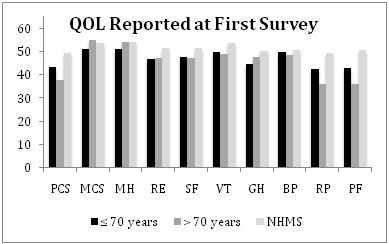Quality of Life in Elderly Kidney Transplant Recipients over 70 Years of Age
Department of Medicine, University of Minnesota, Minneapolis, MN.
Meeting: 2015 American Transplant Congress
Abstract number: A51
Keywords: Elderly patients, Kidney transplantation, Quality of life
Session Information
Session Name: Poster Session A: Delayed Function/Acute Injury/Outcomes/Glomerulonephritis
Session Type: Poster Session
Date: Saturday, May 2, 2015
Session Time: 5:30pm-7:30pm
 Presentation Time: 5:30pm-7:30pm
Presentation Time: 5:30pm-7:30pm
Location: Exhibit Hall E
Objectives:
Kidney transplantation in the elderly provides a survival advantage in comparison with those who remain on dialysis. However, the impact of transplantation on the quality of life (QOL) in recipients over 70 years has not been well studied; hence we evaluated QOL scores in transplant recipients aged 70 and above using the SF-36 survey.
Methods:
Of 4,482 kidney transplants performed between 1963 and 2012, 1,694 recipients (37.8%) responded to the SF-36 survey at least once. Fifty-three recipients aged 70 and above completed the survey, an average of 3.7 years after transplant. Physical and mental scores were compared with those ≤ 70 years (n = 1,641) and the general population obtained through the National Health Measurement Study (NHMS).
Results:
The physical component score (PCS) was 38, 43 and 49 for those > 70, ≤ 70 and NHMS controls (p<0.05). The mental component score (MCS) was 55, 51 and 54 respectively (p<0.05).  The 2 groups (> 70 and ≤ 70) were similar with respect to sex and presence of comorbidities such as congestive heart failure, diabetes mellitus and peripheral vascular disease. However, coronary artery disease was more common in the group > 70 (47.2% vs 28.5%, p = 0.003). No factors were significantly associated with impaired physical score (value < 40) in the group > 70, whereas female gender, coronary artery disease and age at transplantation were predictors of low PCS score in the younger group. Predictors of low mental score (value < 40) were rejection and current age in both groups.
The 2 groups (> 70 and ≤ 70) were similar with respect to sex and presence of comorbidities such as congestive heart failure, diabetes mellitus and peripheral vascular disease. However, coronary artery disease was more common in the group > 70 (47.2% vs 28.5%, p = 0.003). No factors were significantly associated with impaired physical score (value < 40) in the group > 70, whereas female gender, coronary artery disease and age at transplantation were predictors of low PCS score in the younger group. Predictors of low mental score (value < 40) were rejection and current age in both groups.
Conclusion:
Impaired physical QOL is evident in kidney transplant recipients > 70 years, however mental QOL remains intact. Thus, those above 70 years of age should be chosen carefully for kidney transplantation.
To cite this abstract in AMA style:
Rouphael B, Reule S, Matas A, Ibrahim H. Quality of Life in Elderly Kidney Transplant Recipients over 70 Years of Age [abstract]. Am J Transplant. 2015; 15 (suppl 3). https://atcmeetingabstracts.com/abstract/quality-of-life-in-elderly-kidney-transplant-recipients-over-70-years-of-age/. Accessed February 14, 2026.« Back to 2015 American Transplant Congress
